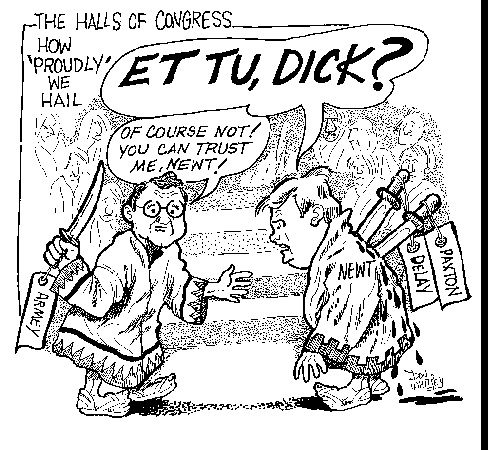
Tourism|__|News|__|Sports|__|Scores|__|Lifestyles|
Golden Years|__|Living off the Land|__|Subscribe Enterprise|
Advertising|__|Alpine Avalanche|__|Monahans News|__|E-Forum|__|Lotto
Links|__|Photos|__|Archives|__|Classified|__|ENTERPRISE HOME PAGE

The main item of interest to most of the public at last week's meeting
seems to be the dress code and discipline issue, which will be touched
on again tonight, as the board wants their attorney to look over their
proposed dress code before they approve it.
It occurs to me that these issues wouldn't be such a major controversy
if all of the students were taught the correct way to behave and dress
when they were small children.
It has been stated several times that the dress code issue was only
brought up as an example of already established rules not being
uniformly enforced.
This seems to be one of those cases of a small minority of the
population ruining things for the majority.
When I was in the military, we called it mass punishment. There were
times when, if one soldier didn't obey rules, their whole squad or
company would have to pay the price. It might not have been fair and it
certainly wasn't popular, but it did cause everyone around the person
who caused the situation to toe the line.
Well, a high school discipline plan is akin to putting a band-aid on a
gaping chest wound. If a student has to be told how to behave in high
school, it is probably too late to expect them to listen or understand
why their behavior will negatively impact their lives.
If a child isn't taught things such as proper manners, correct grammar
and respect for their teachers when they are small, how can they be
expected to grow into respectable young adults? If they don't always
have clean, matching clothing that is in good repair when they are
little, how can we expect that they will value their appearance when
they grow up?
It isn't necessary for children to be from a wealthy family to have a
good upbringing and decent clothes. How difficult is it to sew a button
back on a child's shirt or make sure that their clothes are clean? If
that is too much to ask from a parent, then maybe that person should not
be a parent.
I grew up with children of all economic classes, and their
socioeconomic background was not the major determining factor in the way
they behaved or dressed in their teenage years, or later on. Here, we
have young people from economically disadvantaged families who win
prestigious scholarships and dress neatly, others who grew up at least
well into the middle class and still produce illegitimate children,
behave rudely and do not serve as models of who most people want their
children to become.
Any child has the potential for greatness, but they all need gentle but
firm guidance in the right direction to get there.
EDITOR'S NOTE: Cara Alligood is an Enterprise writer and advertising administrator.
Added to the exemption increase is a provision regarding portability of
a tax freeze on a homestead for owners age 65 or over. Since the wording
is ambiguous, the League of Women Voters of Texas Education Fund has
provided the following explanation.
PROPOSITION No. 1
WORDING ON THE BALLOT: "The constitutional amendment providing school
property tax relief by increasing the residence homestead exemption by
$10,000 and providing for the transfer of the tax limitation to another
qualified homestead for persons over 65 and a reduction in taxes on
homesteads subject to the limitation. "
EXPLANATION
Although school districts raise revenue by taxing property, the Texas
Constitution includes a residential homestead exemption which reduces
taxes for this purpose. The proposed amendment would increase this
exemption from $5,000 to $15,000. In addition, the constitution
currently provides that school property taxes on residential homesteads
of persons 65 years of age or older may not increase as long as they use
that dwelling as a homestead, or until they increase the value of the
property signicantly by making improvements. The amendment would allow
persons to transfer all, or a portion, of the 65-and-over tax freeze
when establishing a different residential homestead. The state
legislature has proposed using the current state budget surplus of one
billion dollars to offset the revenue loss to local school districts
from the proposed increase in the school property tax homestead
exemption.
If this proposition is not approved, voters will have another
opportunity to vote on the portability provision, which would allow
those persons 65-and-over to transfer all or a portion of the tax freeze
to a different residence, in the November 4, 1997, constitutional
amendment election. The August 9 election is necessary to allow school
districts time to revise their tax rates if the proposition is approved.
ARGUMENTS FOR AND AGAINST PROPOSITION #1
Supporters Say:
1. The proposed increased homestead exemption would provide lower tax
bills and needed property tax relief.
2. The 65-and-over tax freeze should follow the individual. The
proposed amendment would allow senior citizens to move to new homes and
still keep the tax freeze.
Opponents Say:
1. If this proposition is approved, it will benefit only the 60 percent
of taxpayers who own their homes, although funded by all taxpayers.
Businesses and renters, for example, will not benefit.
~
2. There is no guarantee that a surplus will be available again two
years from now. Future legislatures may find it necessary to raise taxes
or cut school revenue to continue funding this measure.
EDITOR'S NOTE: The League of Women Voters of Texas Education Fund is
headquartered in Austin, phone 512-472-1100; e-mail lwvtx@aol.com; website www.main.org/leaguewv/home.html.

Those conservative Republicans elected to the U.S. House in 1994 and
some who have followed believed they arrived in Washington with a
mandate and a mission. They have a clear vision of what Congress should
do and what the United States should be, and they are impatient about
all of it not happening soon enough.
When Gingrich didn't lead them where they wanted to go, some decided to
replace him with someone who could - but they didn't agree first on who
that should be, a blunder that killed the coup.
The result so far has been that one member of the leadership, Rep. Bill
Paxon of New York, has resigned. Others, including Texans Dick Armey,
the majority leader, and Tom DeLay, the majority whip, have denied
involvement in the plot, but others say differently and their positions
may be in jeopardy.
It is an extraordinary turn of events, and all the more so when you go
back and take an accounting of all that has transpired in government
over the last three years - mostly in the Republicans' favor.
Granted, Gingrich has made tactical and public relations mistakes that
have stalled the GOP march. But he is the person most responsible for
handing control of Congress to Republicans for the first time in 40
years, and in his time as speaker there has been a fundamental reversal
in welfare policy, a balanced budget agreement with President Clinton
has been reached and the president has agreed to tax cuts.
Those and other outcomes that Republicans once only dreamed about have
occurred under his leadership.
It isn't enough for some, though, and for months Gingrich has been
skewered for doing something that is essential to leadership -
negotiating and compromising.
Gingrich probably isn't well suited for the speaker's job. He was
brilliant as a bomb-throwing "revolutionary," but his style and
personality have not served him well since the GOP came to power. But
someone who is right for the job probably would be even less acceptable
to the "true believers" who want what they want when they want it and
will accept nothing less.
The Republicans, though currently in turmoil, still have the political
advantage. But they're in danger of losing it if the intransigent
right-wing members manage to exert their will. They need to understand
that, while politics is about ideas, it isn't winner-take-all. -- San Angelo Standard Times
In their fury to protect the ozone no matter how small the threat,
these bureaucrats forgot about protecting people. For example, Alexis
and her mother both suffer harmful reactions to the other asthma
inhalers on the market. But still the EPA and FDA were ready to
sacrifice their health for the tiny amounts of chemicals these inhalers
emit into the air.
This story is another classic example of government bureaucrats
ignoring common sense. Did the EPA ever consider that this little girl,
her mother and who knows how many other asthma sufferers would have no
suitable alternative if this inhaler was not available? With the
billions of taxpayer dollars they get, couldn't they invest a nickel of
it in common sense?
The EPA's current push to tighten the rules on ozone, what we call
smog, and particulate matter, what we call dust, once again shows their
lack of common sense. The EPA says that these stricter rules will make
America healthier. But The EPA still has a lot of how, when, where and
why's to clear up before any real benefits of its stricter rules are
clear.
We have not seen the EPA's reasons behind stricter clean air rules, but
we have seen the forecasts of what life could be like if the rules are
imposed. First, these proposed rules could cost 280 urban and rural
American counties billions of dollars. Americans could see higher gas
prices, forced car pooling or even restrictions on backyard barbeques
thanks to the EPA's plan. These are high costs to pay for only a
marginal benefit from stricter clean air rules. Still, the EPA is gung
ho with going forward with its plan.
Frustrated by all the lingering unanswered questions and EPA's failure
to justify its proposal, this Congress is working to get answers.
Legislation recently introduced in the House of Representatives, the
Clean Air Standards bill, would force the EPA to give the American
people the facts so they can decide for themselves about the new clean
air rules. We may drag the EPA kicking and screaming, but we will get
answers to these important questions.
The EPA should learn a lesson from Alexis Milmine. She got her facts
together and presented her case clearly. The EPA, on the other hand,
apparently doesn't have the facts and is avoiding telling us the real
story. Their own scientists question these new regulations, but the
bureaucrats won't stop. I guess they just expect us to sit back and
trust them. The American people are the ones who will have to foot the
$6 billion bill. They deserve answers.
EDITOR'S NOTE: Henry Bonilla represents the 23rd Congressional District
in the U.S. House of Representatives.
Pecos Enterprise
Mac McKinnon, Publisher
Division of Buckner News Alliance, Inc.
324 S. Cedar St., Pecos, TX 79772
Phone 915-445-5475, FAX 915-445-4321
e-mail: news@bitstreet.com
Associated Press text, photo, graphic, audio and/or video material shall not be published, broadcast, rewritten for broadcast or publication or redistributed directly or indirectly in any medium. Neither these AP Materials nor any portion thereof may be stored in a computer except for personal and non-commercial use. The AP will not be held liable for any delays, inaccuracies, errors or omissions therefrom or in the transmission or delivery of all or any part thereof or for any damages arising from any of the foregoing.
Copyright 1997 by Pecos Enterprise
We support Newspapers in Education